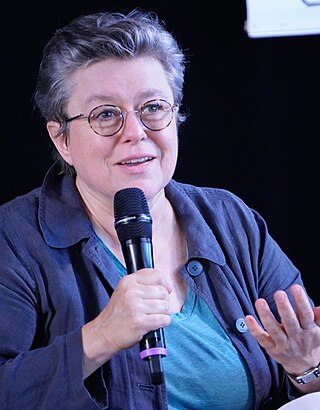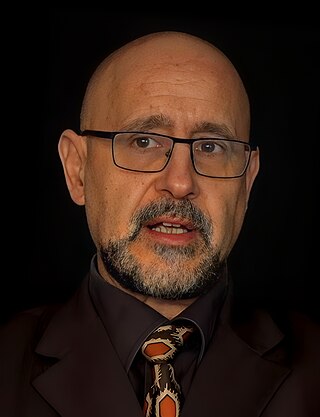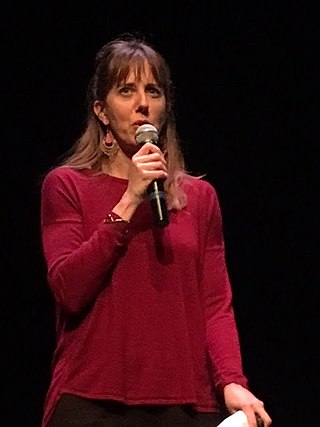
Sandra Laugier is a French philosopher, who works on moral philosophy, political philosophy, philosophy of language, gender studies, and popular culture. She is a full professor of philosophy at the University of Paris 1 Panthéon-Sorbonne and a Senior member of the Institut Universitaire de France. She currently serves as the deputy director of the Institut des sciences juridique et philosophique de la Sorbonne. In 2014, she received the title of the Chevalier de la Légion d’honneur. In 2022, she was awarded the Grand Prix Moron by the Académie française. In 2024, she was elected to the American Philosophical Society.

Dominique Venner was a French historian, journalist, and essayist. Venner was a member of the Organisation armée secrète and later became a European nationalist, founding the neo-fascist and white nationalist Europe-Action, before withdrawing from politics to focus on a career as a historian. He specialized in military and political history. At the time of his death, he was the editor of the La Nouvelle Revue d'Histoire, a bimonthly history magazine.

The Edgar Morin Centre, formerly CETSAH, is a graduate teaching and research unit of the École des Hautes Études en Sciences Sociales (EHESS) and of the French Centre National de la Recherche Scientifique, Paris. The centre, named after social theorist and intellectual Edgar Morin, is part of the Institut Interdisciplinaire d'Anthropologie du Contemporain.

Jean Tulard is a French academic and historian. Considered one of the best specialists of Napoleon Bonaparte and the Napoleonic era, he is nicknamed by his peers "the master of Napoleonic studies".
Maurice Vaïsse is a French historian specialised in international relations and Defence. He is an editorial board member on Journal of Intelligence and Terrorism Studies.

Nicolas Werth is a French historian.
Joseph-Antoine Castagné was a French professor at the gymnase d'Orenbourg in Orenburg, Russia, an ethnographer and an expert on Central Asia. He wrote extensively about Russian Turkestan.

Yves-Marie Bercé, is a French historian known for his work on popular revolts of the modern era. He is a member of the Institut de France.

Laure Murat, born 4 June 1967, in Paris, is a French historian, writer, and professor at the University of California, Los Angeles.

La France Insoumise is a left-wing political party in France. It was launched in 2016 by Jean-Luc Mélenchon, then a Member of the European Parliament (MEP) and former co-president of the Left Party (PG). It aims to implement the eco-socialist and democratic socialist programme L'Avenir en commun. The party utilises the lower case Greek letter phi as its logotype.

Esther Benbassa is a French-Turkish-Israeli historian and politician. She specializes in the history of Jews and other minorities. Since 2011, Benbassa has served as a French senator, representing Paris from 2017 onwards and Val-de-Marne from 2011 to 2017.
Jeanne Gaillard was a French historian and a member of the French Resistance during the Second World War.
Anne-Marie Devreux is a French sociologist specializing in feminism and the sociology of gender relations.

Isabelle Garo, is a French philosopher specialising in the works of Karl Marx.

Pierre Serna is a French historian, and specialist in the French Revolution. He is currently a university professor at the University of Paris 1 Pantheon-Sorbonne, and a member of the Institute for the History of the French Revolution which he directed from 2008 to 2015 before his integration into the Institut d modern and contemporary history (IHMC).

Louis-Jean Calvet is a French linguist.

The New Ecological and Social People's Union was a left-wing electoral alliance of political parties in France. Formed on May Day 2022, the alliance included La France Insoumise (LFI), the Socialist Party (PS), the French Communist Party (PCF), The Ecologists (LE), Ensemble! (E!), and Génération.s (G.s), and their respective smaller partners. It was the first wide left-wing political alliance since the Plural Left in the 1997 French legislative election. Over 70 dissident candidates who refused the accord still ran.

Mathilde Larrère, born in Paris is a French historian and activist. She is a specialist in revolutionary movements and policing in 19th century France.
Suzanne de Nervèze was a French writer of the 17th century, considered part of the French literary style and movement known as préciosité, sometimes known under the pseudonyms of Némésis and Nérésie.
Christian Amalvi is a French academic, professor of contemporary history and former lecturer at the University of Montpellier (1991–2023), known for his works on contemporary history.














